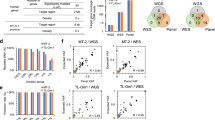Abstract
Adult T-cell leukemia/lymphoma (ATLL) is the neoplasm caused by human T-cell leukemia virus type 1 (HTLV-1). We performed oligoarray comparative genomic hybridization (CGH) against paired samples comprising peripheral blood (PB) and lymph node (LN) samples from patients with acute-type ATLL. Results disproved the established theory that true monoclonal proliferation, such as identical clonal expansion in all respects, occurred in acute-type ATLL, and our findings revealed that acute-type ATLL contains multiple subclones with differing genomic aberrations. Oligoarray CGH technology has been developed not only for high-resolution application but also for use in various analyses. Our original analysis is a method of identifying two or more clones with different chromosomal aberrations in one sample. Herein, we describe the analysis and clonal evolution of acute-type ATLL.
Access this chapter
Tax calculation will be finalised at checkout
Purchases are for personal use only
Similar content being viewed by others
References
Uchiyama T, Yodoi J et al (1977) Adult T-cell leukemia: clinical and hematologic features of 16 cases. Blood 50(3):481–492
Poiesz BJ, Ruscetti FW et al (1980) Detection and isolation of type C retrovirus particles from fresh and cultured lymphocytes of a patient with cutaneous T-cell lymphoma. Proc Natl Acad Sci U S A 77(12):7415–7419
Shimoyama M, Abe T et al (1987) Chromosome aberrations and clinical features of adult T cell leukemia-lymphoma not associated with human T cell leukemia virus type I. Blood 69(4):984–989
Maciejewski JP, Tiu RV et al (2009) Application of array-based whole genome scanning technologies as a cytogenetic tool in haematological malignancies. Br J Haematol 146(5):479–488
Shimoyama M (1991) Diagnostic criteria and classification of clinical subtypes of adult T-cell leukaemia-lymphoma. A report from the Lymphoma Study Group (1984–87). Br J Haematol 79(3):428–437
Umino A, Seto M et al (2011) Clonal evolution of adult T-cell leukemia/lymphoma takes place in the lymph nodes. Blood 117(20):5473–5478
Author information
Authors and Affiliations
Corresponding author
Editor information
Editors and Affiliations
Rights and permissions
Copyright information
© 2013 Springer Science+Business Media, LLC
About this protocol
Cite this protocol
Umino, A., Seto, M. (2013). Array CGH Reveals Clonal Evolution of Adult T-Cell Leukemia/Lymphoma. In: Banerjee, D., Shah, S. (eds) Array Comparative Genomic Hybridization. Methods in Molecular Biology, vol 973. Humana Press, Totowa, NJ. https://doi.org/10.1007/978-1-62703-281-0_12
Download citation
DOI: https://doi.org/10.1007/978-1-62703-281-0_12
Published:
Publisher Name: Humana Press, Totowa, NJ
Print ISBN: 978-1-62703-280-3
Online ISBN: 978-1-62703-281-0
eBook Packages: Springer Protocols




